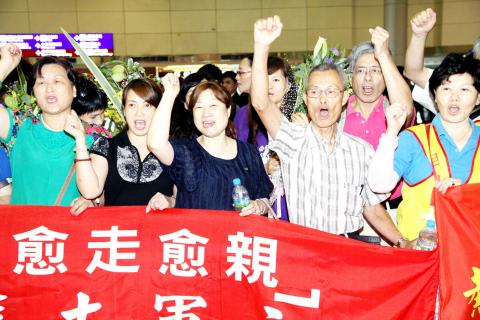The number of Chinese businesspeople and white-collar workers traveling to Taiwan on business visas, which surpassed 110,000 last year, poses a growing threat to the nation’s job market and security, political observers said.
National Immigration Agency (NIA) statistics show the number of Chinese business travelers has increased from 15,000 in 2005 to 34,000 in 2008, 77,000 in 2013 and 111,422 last year.
The figure is expected to balloon if the cross-strait service trade pact is passed, which would allow more businesspeople and white-collar employees to work in this country, lowering wage levels, worsening youth unemployment and threatening national security, National Cheng Kung University law professor Hsu Chung-hsin (許忠信) said.

Photo: AFP
Hsu said that following an amendment to the Entry Permission to Taiwan Area for the People from Mainland China (大陸地區人民進入台灣許可辦法) in 2013, the immigration agency lifted restrictions on companies eligible for business entry, including the requirement of a minimum annual revenue of NT$10 million (US$317,900) and a maximum of 400 entries per year.
In addition to the 103,742 business travelers who stayed less than six months last year, 7,680 Chinese were employed in the name of “fulfilling a contract,” such as international job transfers, goods inspection, technical counseling and after-sale service, Hsu said.
Chinese businesspeople and white-collar workers can initially stay in Taiwan for three years and are eligible to have their stay extended, with no restriction on the number of renewals, he said.
The immigration agency and Ministry of Labor are unable and unwilling to deal with Chinese workers in Taiwan, Taiwan Labor Front secretary-general Son Yu-liam (孫友聯) added, citing an incident in New Taipei City in December last year in which a Chinese technician died while installing an elevator, proving that Chinese are working in Taiwan.
Son said the ministry requires that foreign workers be paid a monthly salary of at least NT$47,971 and that employers purchase labor insurance for their employees against occupational injuries, but that Chinese businesspeople are not under the jurisdiction of the ministry and are not subject to employment regulations.
Chinese businesspeople and white-collar workers provide a convenient option for employers who wish to cut costs, Son said.
Hsu cited a recent article in Defense News that said Taiwan’s open policy toward China helps pave the way for the Chinese People’s Liberation Army to conduct clandestine activities to infiltrate Taiwanese society.
Chinese businesspeople and white-collar workers could pose an even greater threat to Taiwan’s national security than ordinary Chinese tourists, as they can stay in Taiwan for an extended period of time and become a “Chinese fifth column,” Hsu said.
The NIA said that easing entry regulations for Chinese businesspeople is aimed at facilitating small and medium-sized firm’s operations, and that it would redouble its inspections of such visitors.

NATIONAL SECURITY THREAT: An official said that Guan Guan’s comments had gone beyond the threshold of free speech, as she advocated for the destruction of the ROC China-born media influencer Guan Guan’s (關關) residency permit has been revoked for repeatedly posting pro-China content that threatens national security, the National Immigration Agency said yesterday. Guan Guan has said many controversial things in her videos posted to Douyin (抖音), including “the red flag will soon be painted all over Taiwan” and “Taiwan is an inseparable part of China,” while expressing hope for expedited “reunification.” The agency received multiple reports alleging that Guan Guan had advocated for armed reunification last year. After investigating, the agency last month issued a notice requiring her to appear and account for her actions. Guan Guan appeared as required,

Japan and the Philippines yesterday signed a defense pact that would allow the tax-free provision of ammunition, fuel, food and other necessities when their forces stage joint training to boost deterrence against China’s growing aggression in the region and to bolster their preparation for natural disasters. Japan has faced increasing political, trade and security tensions with China, which was angered by Japanese Prime Minister Sanae Takaichi’s remark that a Chinese attack on Taiwan would be a survival-threatening situation for Japan, triggering a military response. Japan and the Philippines have also had separate territorial conflicts with Beijing in the East and South China

A strong cold air mass is expected to arrive tonight, bringing a change in weather and a drop in temperature, the Central Weather Administration (CWA) said. The coldest time would be early on Thursday morning, with temperatures in some areas dipping as low as 8°C, it said. Daytime highs yesterday were 22°C to 24°C in northern and eastern Taiwan, and about 25°C to 28°C in the central and southern regions, it said. However, nighttime lows would dip to about 15°C to 16°C in central and northern Taiwan as well as the northeast, and 17°C to 19°C elsewhere, it said. Tropical Storm Nokaen, currently

PAPERS, PLEASE: The gang exploited the high value of the passports, selling them at inflated prices to Chinese buyers, who would treat them as ‘invisibility cloaks’ The Yilan District Court has handed four members of a syndicate prison terms ranging from one year and two months to two years and two months for their involvement in a scheme to purchase Taiwanese passports and resell them abroad at a massive markup. A Chinese human smuggling syndicate purchased Taiwanese passports through local criminal networks, exploiting the passports’ visa-free travel privileges to turn a profit of more than 20 times the original price, the court said. Such criminal organizations enable people to impersonate Taiwanese when entering and exiting Taiwan and other countries, undermining social order and the credibility of the nation’s